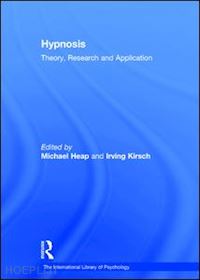Contents: Series preface; Introduction. Part I The Birth of Modern Hypnosis: Quantitative methods of investigating hypnotic suggestion, Clark L. Hull; A preface to a theory of hypnotism, Robert W. White. Part II Theories of Hypnosis: The Altered State Debate: Contributions to role-taking theory: I hypnotic behaviour, Theodore R. Sarbin; The nature of hypnosis: artefact and essence, Marin T. Orne; Towards a scientific explanation of 'hypnotic' behaviour, Theodore X. Barber; Altered states of awareness, Ernest R. Hilgard; A frontal assault in dissociated control, Kenneth S. Bowers. Part III Theories of Hypnosis: Divergence and Convergence: Toward a neo-dissociation theory: multiple cognitive controls in human functioning, Ernest R. Hilgard; Hypnotic behaviour: a cognitive social psychological perspective, Nicholas P. Spanos; Response expectancy as a determinant of experience and behaviour, Irving Kirsch. Part IV Individual Differences in Hypnotic Suggestibility: The heritability of hypnotic susceptibility in twins, Arlene H. Morgan; Openness to absorbing and self-altering experiences ('absorption'), a trait related to hypnotic susceptibility, Auke Tellegen and Gilbert Atkinson; A social-cognitive skills approach to the successful modification of hypnotic susceptibility, Donald R. Gorassini and Nicholas P. Spanos Fantasy-proneness: hypnosis, developmental antecedents and psychopathology, Steven Jay Lynn and Judith W. Rhue; On the degree of stability of measured hypnotisability over a 25-year period, Carlo Piccione, Ernest R. Hilgard and Philip G. Zimbardo; Imaginative suggestibility and hypnotisability, Irving Kirsch and Wayne Braffman. Part V Investigating Hypnotic Phenomena: Pain and dissociation in the cold pressor test a study of hypnotic analgesia with 'hidden reports' through automatic key pressing and automatic talking, Ernest R. Hilgard, Arlene H. Morgan and Hugh Macdonald; Contextual demands, negative hallucinations, and hidden observer responding: 3 hidden observers observed, Nicholas P. Spanos, Deborah M. Flynn and Maxwell I. Gwynn; Increasing contextual pressures to breach posthypnotic amnesia, William C. Coe and Anne S.E. Sluis; Hypnotic and posthypnotic suggestion: finding meaning in the message of the hypnotist, Amanda J. Barnier and Kevin M. McConkey. Part VI Neuropsychological and Neurophysiological Research and Theories: Brain dynamics and hypnosis: attentional and disattentional processes, Helen J. Crawford; Pain affect encoded in human anterior cingulate but not somatosensory cortex, Pierre Rainville, Gary H. Duncan, Donald D. Price, Benoît Carrier and M. Catherine Bushnell; A working model of the neuropsychophysiology of hypnosis: a review of evidence, John Gruzelier; Psychphysiological correlates of hypnosis and hypnotic susceptibility, Vilfredo de Pascalis. Part VII Clinical Applications: Hypnosis: practical applications and theoretical considerations in normal labour, Mary W. Jenkins and M.H. Pritchard; Hypnosis as an adjunct to cognitive behavioural psychotherapy: a meta-analysis, Irving Kirsch, Guy Montgomery and Guy Sapirstein; Long term benefits of hypnotherapy for irritable bowel syndrome, W.M. Gonsalkorale, V. Miller, A. Afzal and P.J. Whorwell; Hypnosis and clinical pain, David R. Patterson and Mark P. Jensen. Part VIII Professional and Legal Issues: Scientific status of refreshing recollection by the use of hypnosis, American Medical Association; Recalling the unrecallable: should hypnosis be used to recover memories in psychotherapy?, Steven Jay Lynn, Timothy G. Lock, Bryan Myers and David G. Payne; The alleged dangers of stage hypnosis, Michael Heap; Immediate and persisting effects of misleading questions and hypnosis on memory reports, Alan Scoboria, Guiliana Mazzoni, Irving Kirsch and Leonard S. Milling; Name index; Name Index.











